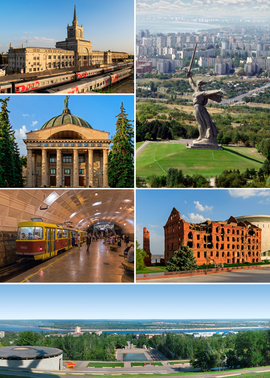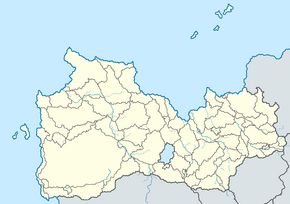Velike Vishnavaya
This article is incomplete because it is pending further input from participants, or it is a work-in-progress by one author. Please comment on this article's talk page to share your input, comments and questions. Note: To contribute to this article, you may need to seek help from the author(s) of this page. |
Velike Vishnavaya
Велика Вишнавая | |
|---|---|
 Clockwise from top left: Gordienko Station, Our Lady, The Republic, Ruins of the Old Town Hall, Panorama from the River Kvasy, Velike Metro, Velike Space Centre | |
| Nickname(s): Місто зірок Misto zirok ("The city of stars") | |
| Country | |
| Province | Kriklivets |
| Government | |
| • Body | City Council |
| • Mayor | Klára Gecza |
| Area | |
| • Provincial-level city | 518 km2 (200 sq mi) |
| • Land | 515.4 km2 (199.0 sq mi) |
| • Water | 2.6 km2 (1.0 sq mi) |
| • Metro | 5,918 km2 (2,285 sq mi) |
| Population (2019) | |
| • Provincial-level city | 1,361,320 |
| • Density | 2,600/km2 (6,800/sq mi) |
| Demonym(s) | Vishnavayans, Velikiv |
| Area code | 78167–78179 |
| Website | velike |
Velike Vishnavaya (/vɛlɪkiː
Settled in 1119 as a merchant city for trade with central Euclea during the Duchy of Pavatria, the city remained as a small town until greater expansion into central Euclea saw it grow in size, eventually coming to be used as an important fort and settlement for the administration of Soravia's territories east of the Tsyr. Until the 1400s, the city was the third largest in Soravia, and an influential city and inland centre of trade. Velike Vishnavaya was well connected by road to Pavatria and Samistopol as well as the port of Luchintsy. Louis II raised Velike Vishnavaya to an official city in 1640 and made it capital of the Kriklivets Governorate in 1643, replacing the city of Malbay.
Due to its shielded location, well into mainland Soravia at the time, Velike Vishnavaya suffered little damage and rarely saw any combat throughout the 18th and 19th centuries. Migration to the city increased from the south and eastern parts of the country during the Ten Years' War. The city did however see combat during the War of the Triple Alliance, where it was sieged and much of the older buildings in the city damaged. Throughout the Great War the city was mainly untouched by Entente forces but did see urban combat from the Voyins movement in the early 1930s. In 1966 the Velike Space Centre was opened by Gabriel Tozulyak, and much of Soravia's space research was conducted in the city, giving it the name of the "city of stars". The Velike Vishnavaya metro network first opened in 2003 and continues to operate across the city.
Velike Vishnavaya is a modern-city and its financial and business district, named Mistor, boasts one of the highest concentrations of skyscrapers in the company. It also has an international airport that flies to all continents and is well-connected to central Euclea by train and road. Residents of the city are referred to as Vishnavayans in Estmerish and Velikiv in Soravian.
